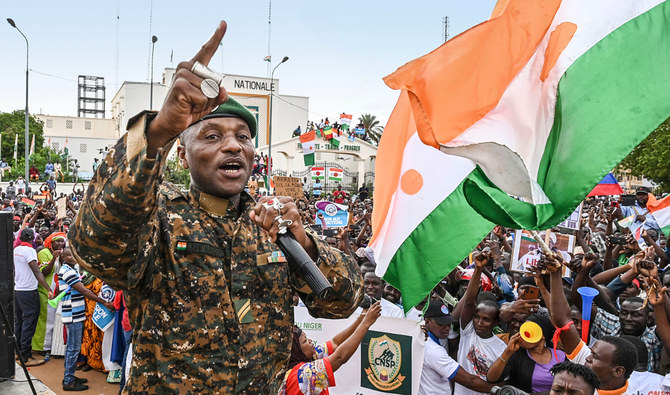LAGO: A call by Niger’s coup leaders for a three-year transition back to democracy is “unacceptable,” a representative of the West Africa bloc ECOWAS has said.
Niger’s Gen. Abdourahamane Tiani — who took power after army officers toppled President Mohamed Bazoum on July 26 — said over the weekend that a transition of power would not go beyond three years.
He spoke after a delegation from the Economic Community of West African States, also known as ECOWAS, visited Niger for a final diplomatic push before deciding whether to take military action against Niger’s new rulers.
“The three-year transition is unacceptable,” Abdel-Fatau Musah, ECOWAS commissioner for politics and security, told Al Jazeera channel in an interview broadcast on Monday.
“We want constitutional order to be restored as soon as possible.”
In his televised address on Saturday, Tiani charged ECOWAS with preparing to attack Niger by setting up an occupying force in collaboration with a foreign army, without referencing which country.
“If an attack were to be undertaken against us, it will not be the walk in the park some people seem to think,” he said.
ECOWAS leaders say they have to act now that Niger has become the fourth West African nation since 2020 to suffer a coup, following Burkina Faso, Guinea and Mali.
The bloc has agreed to activate a “standby force” as a last resort to restore democracy in Niger and has said it is ready to act though it is still pursuing diplomacy.
But it has given no date or details about any intervention.
The coup has heightened international worries over instability in the Sahel region, which faces growing insurgencies linked to Al-Qaeda and Daesh.
Niger has been hit by several militant attacks since last month, but analysts caution against concluding that a long-running insurgency is shifting into higher gear as post-coup uncertainty mounts.
Since 2015, when militants started mounting cross-border strikes from Mali, thousands of people have died and hundreds of thousands have fled their homes.
In the first half of 2023, attacks on civilians fell by 49 percent compared with the same period in 2022, while the number of deaths was down by 16 percent, according to Armed Conflict Location & Event Data project, an NGO monitor.
Western observers and partners, especially France, Bazoum’s ally, had been quick to highlight the improvement.
They praised a shift in strategy that began after Bazoum took office in April 2021 following historic elections.
The military regimes in Mali and neighboring Burkina Faso focus on hefty “anti-terrorist” operations that are often blamed for heavy loss of civilian life.
But Bazoum fostered localized peace agreements, development projects and negotiations with heads of armed groups — a flexible approach hailed as highly promising by western partners, but often criticized at home, especially within the army.
A June 2022 opinion poll by Afrobarometer found a big difference between rural and urban dwellers about how they rated Niger’s security situation.
People in the cities were far likelier to say that the problems were bad, even though people in the countryside were far likelier to be victims of violence.
“Urban people are more politically aware and have better access to information ... and the higher one’s standard of living, the more importance one attaches to issues of security and health,” said Mahamane Tahirou Ali Backo, an associate researcher at a Niamey-based social monitor called LASDEL, who took part in the survey.
“The highest-profile attacks are against symbols of state or are large-scale attacks, but background violence is a daily phenomenon, because of gangs and the guns in circulation,” he said. But rating insecurity on figures alone is not always accurate, say analysts.














